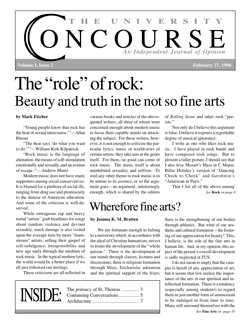Core curriculum (2)
by Jim Fox
I just read with great delight Dr. Crosby’s diagnosis of our current general education (in the February 13 issue of the Concourse) and want to reply forthwith.
It is inconceivable to me that a university can be a community of scholars without some common body of literature to discuss. An overly intellectually disparate group of people has too little in common to be called an intellectual community. Absent some common core of education, how can an intellectual environment be created outside the classroom, where one subject enlightens another, so that, to paraphrase John Paul II, our students might make sense to each other?
Most of our more recent alumni certainly do not point to some core of knowledge, or Catholic intellectual culture, that has left an indelible print upon their minds or has sharpened their critical thinking on morals and ethics, or on any other issue for that matter. (Notable exceptions are Humanities and Catholic Culture grads.) Noteworthy, too, is that I have heard from alumni who graduated before the curriculum change about how their liberal arts education formed their minds, gave them a competitive edge in their professions, prepared them to grapple with the myriad of challenges they faced in the modern world, and paved the way for a life-long education. Many of them are deeply grateful for the liberal arts education they received at Franciscan University.
I attended an experimental liberal arts school in the University of Oklahoma system, where a rigorous core of interdisciplinary studies was required of every student, who thus received an education in certain fundamentals of science, math, literature, history, philosophy, physical education, the fine arts, and so forth. While impoverished by its secular nature, every year I am more appreciative of that education.
Catholic education ought to be more than learning a profession. It ought to develop a life of the mind that asks questions such as, “Why is there something and not nothing? Who is man? What is he for? And, what is his end?” It ought to help him see what is true and beautiful in life, teach his soul to soar when it encounters such beauty, and impel him to give to humanity more of what is beautiful, true, and eternal. A Catholic education should give every student a lifelong appreciation for history, philosophy, music, art, literature, theology, science, business indeed that whole host of human endeavors. A grounding in “the fundamentals” is so valuable because the fundamentals are eternal. Unlike this or that technique which comes and goes, fundamental truth increases in value because it forms a unified foundation for a full and happy life in Him who is Truth, Jesus Christ.
Jim Fox, Executive Director of University Relations
N.B. The views the author here expresses are his own, and are not necessarily shared by the University.


